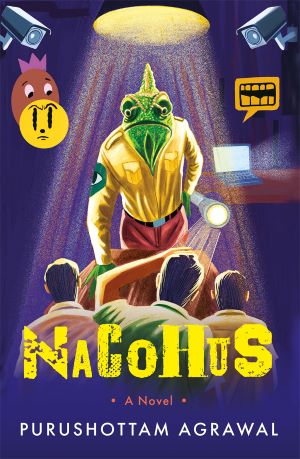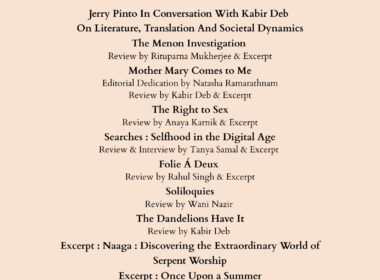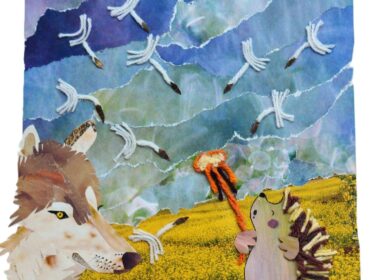Suket had begun his talk with the oppression of the Hindus in the Valley. The progressive elements present in the meeting felt let down: ‘His leftist DNA has always been suspect, and now he is irreversibly on the road to Hindutva.’
The ultra-revolutionary young poet Mishraji—known for his research on Pandeyji, under the supervision of Chaturvediji, and also for working as a sub-editor under Trivediji in a journal owned by Sharmaji—felt vindicated as he listened to Suket’s piece. His belief that no non- Brahmin could either be an intellectual or talented or even truly progressive stood validated yet again. A revolution was the need of the hour, but he knew that it could only be brought about by the intellectual elite, the Brahmins! Mishraji made sure to broadcast through his latest- technology-boasting smartphone the revelation of the impending Hinduization of the non- Brahmin pseudo-progressive Suket.
Also in attendance at the event were an army of gallant nationalists. They had come with the sole purpose of teaching intellectual terrorists a much needed lesson. And so, as soon as Suket began talking about minorities and towns, they became animated.
Who cared about meetings and dialogue? All that mattered was the tandav of hurt sentiments!
‘What right do these secularists have to hurt the sentiments of the majority? Give them a good thrashing. Motherfu—anti-nationals!’
The speaker was never going to receive mere verbal condemnation. The organizers had obviously anticipated the critique to be more hands-on, if you will. They might have been less in number but were equally zealous. Their response was quick and enthusiastic.
The collision of these two enthusiasms turned Suket’s body into the military outpost at the border of two hostile nations—one army hell-bent on destroying and the other determined to protect it. He could sense martyrdom—unwilling on his part—in the air. Fortunately, the battle didn’t last very long. The strategy of the bravehearts, as always, was to attack a soft target. The target was of course soft as mush, but the warriors fighting on his behalf were hard and unyielding as the shell of a wood-apple. The moment the bravehearts realized this, they beat a well-timed retreat. As it was, they had successfully managed to deliver some very effective blows to the person who had hurt national sentiment.
‘We spoke like this on these matters before, didn’t we?’ Suket had said to Raghu and Shams who brought him home after his talk. ‘But we were never beaten up like this… I mean, even when things came to blows in heated discussions, there’d generally be sympathy for people like us. People were ready to question themselves. Now we are told, “Don’t unnecessarily ‘stir up’ trouble; why hurt any sentiments?” What’s wrong with them?’
It was a gloomy evening. Both Raghu and Shams hoped Suket’s pain would lessen, and that he’d shrug off the humiliation of being so brazenly manhandled. They made constant attempts at small talk, but it was little use.
The dim light of the room was getting blurry still. It seemed as if an oil lamp had been lit, one whose wick was nearing its end. Questions shadowed Suket’s face as he half lay on the bed.
Their failure at taking his mind off his hurt clearly showed on the faces of both Shams and Raghu.
Suddenly, Shams stood up and announced that he would make tea before walking towards the kitchen.
‘That’s it, Suket,’ Raghu spoke up after reflecting a while in silence. ‘Things have changed while we just looked on. It’s not that country any more, it’s not those times any longer—the ones that we had become used to.’
‘So what do you suggest we do? Get used to the changed times?’
‘Yaar, Suket,’ Shams called from the kitchen, ‘you have got to call the pest-control services; there are termites in the kitchen. What’s this, man? You don’t take care.’
‘Trying to learn how to peacefully co-exist, Shams,’ Suket replied loudly, ‘with termites—in the house and outside!’
Shams agreed with Suket. ‘You’re being sensible there! What else can we do? Termites are everywhere these days,’ he said as he walked in with the tea.
‘I am not asking you to get used to it.’ Raghu felt Suket had read a wish to surrender in his words. ‘We are not to get habituated to either the termites within the house or those outside, but—’
‘Don’t they say that the world is getting smaller, becoming a global village, et cetera?’ Suket said.
‘It actually is becoming smaller…narrowing down. It’s shrinking from within.’
Taking the tea cup from Shams’s extended hand, Raghu got up and went and stood near the window. The outside was yellow too, but not the weakening, jaundiced yellow of the light inside.
It was the shining, glittering, complete yellow of the halogen lamp.
‘You’re right, Suket,’ Raghu said, still staring outside. Fatigue seemed to have seeped into his voice. ‘It appears someone is bent on putting us all and our consciousness in a straightjacket, with no scope of the slightest movement.’
‘Not a straightjacket, boss,’ Shams spoke up from where he was sitting, ‘they want to force us into dog leashes. No ban on movement provided you follow all instructions and wag your tails for your masters! You can even bark as long as you’re chained tightly.’
‘But…’
Raghu tried to say something. But he just stood there, looking out the window, and repeated,
‘But…’
The three of them knew. Beyond that ‘but’ lay either a scorching desert or a bone-chilling, icy void. Or, if you will, an eerie silence or a deafening clamour. Words were little use beyond that ‘but’. There were, in fact, to employ yet another metaphor, no words, just a fetid swamp beyond it. That ‘but’ met them like a fringe meets its metropolis—a metropolis which has for years been dumping all its garbage on said fringe. The expansion of the metropolis is inexorable, the face- off with the mountain of garbage inevitable. The metropolis tries to prevent the stench of the garbage from reaching the city centre, where dwell the real masters. But sometimes the mountain catches fire, and the miasma engulfs the metropolis, and the fringe registers its presence.
Through the slightly open window, Raghu could sense a sickening smell. It may well have been the case that he had divined the metaphor we have just employed but for the fact that there indeed was an actual mountain of garbage not too far off.
‘There’s fire on the mountain again…’ he said.
‘And nobody seems to be on the run,’ replied Suket.
‘The best is to live with what’s already done,’ was Shams’s contribution to the silly rhyme.
‘The stench will consume us all in the long run.’
The cup in Suket’s hands came to a rest before reaching his lips. Shams sat peering into his own, his neck bent with the weight of apprehension and fatigue. The rhyme just composed chimed only too well with the silence and the dim light in the room. Raghu closed the window softly, and turned towards Suket and Shams as if denying the presence of that detestable smell with an attempt at a smile.
‘Damn! One more chance of becoming a martyr wasted!’ At long last, Suket tried to lighten the mood.
‘Not yours, it has been our loss!’ Shams jumped at the opportunity. Putting his cup down on the table, wiping the concern off his face, he put on a mask of dramatic pathos and spoke as if delivering a dialogue, ‘The name on the martyrs’ list would have been yours and it would have been the privilege of Raghu and myself to be your worthy inheritors. Like the poet said long ago, there will be fairs at the funeral pyres of martyrs… And there certainly would have been at our own martyr Suket’s. And if not, we’d have arranged them ourselves! We could have handed out contracts for shops at this fair, collected the rent. Am I right, Sir Raghu Ruben?’
‘What is right about it? Not only did the honoured martyr not reach the pyre, he hasn’t even suffered permanent injuries!’ Raghu too now joined this game. Finally leaving the window, he walked up to the other two, ‘If not death, even a permanent flaw in his gait or posture—something visible would have done the trick. If not a full-time martyr, respected Suketji could have at least become a part-time martyr. At least of some use to his friends in the martyrdom market!’
‘No, yaar, we already have you as our part-time martyr. Now we need a full-time one—either on a pyre or inside a grave!’ Shams contradicted Raghu, who carried his trophies in the form of steel rods in his knees.
‘Doesn’t matter,’ Raghu came back. ‘Now that this character has failed, we’ll focus on making a full-time martyr out of you. Tell me your last wish—want to ascend to jannat by the grace of the Wahhabis or at the kind hands of Hindu nationalists?’
Suket was enjoying this effort to lift their spirits.
‘None of us are going to gain entry into jannat, beta! My Bhagwan and your Allah and God will have at least this much sense. Why would He want to invite tumult in his swarg-jannat- heaven? And, you two nincompoops. Are you here to mourn the fact that I just escaped death?’ He held out a hand towards Shams and said, ‘Behave now! You must have brought cigarettes to overcome your grief at this lost opportunity. Present them immediately, in the service of the could-have-been-martyred!’
‘Smoking kills. If you have to die, die of a beating. You’ll just die of cancer if you smoke, not for a cause.
And worse, you’ll be a polluting criminal! All the booty that comes with martyrdom will be lost to you…to us, more importantly.’
‘Wah beta! You die of smoking and I die of a beating! Let’s exchange roles. Let the grace be yours and the income from fairs mine—you dead, me fed. And while you’re at it, have some regard for a friend’s hurt sentiments. Stop this nonsense and let’s have the cigarettes. Let’s go!’ Laughter is a medicine indeed. Lessens the pain of life and the fear of death. And Suket, Shams and Raghu have much to show for talking sense in this age of hurt sentiments—assorted memorabilia, physical as well as psychological. Some are visible in the crookedness of the gait, some audible in the hiss of pain as old wounds bite in the winter chill.
Extracted from NaCoHuS: By Purushottam Agrawal; translated by Noor Zaheer and Ritambhara Agrawal. Published by Speaking Tiger Books, 2023.
Born in 1955, Purushottam Agrawal served as member, UPSC from 2007 to 2013. Before this, he was Chairperson, Centre of Indian Languages, JNU. He has also been Visiting Professor at the Faculty of Oriental Studies, Cambridge University and at El Colegio de Mexico. His books include Hindi Serai: Astrakhan via Yerevan, a travelogue which traces the history of Indian traders who settled in the Russian city of Astrakhan between the 16th and 18th centuries; Padmavat: An Epic Love Story, an English translation of and commentary on Malik Muhammad Jayasi’s epic poem; Who Is Bharat Mata?, a collection of writings by and on Jawaharlal Nehru; and Kabir, Kabir: The Life and Work of the Early Modern Poet- Philosopher, an English translation of his 2009 book Akath Kahani Prem Ki, widely acclaimed as a path-breaking study of Kabir and his work.
Noor Zaheer is a writer, theatre director and researcher. She writes in English, Hindi and Urdu. She is the author of My God is a Woman.
Ritambhara Agrawal is a Delhi-based writer, photographer and video producer.





